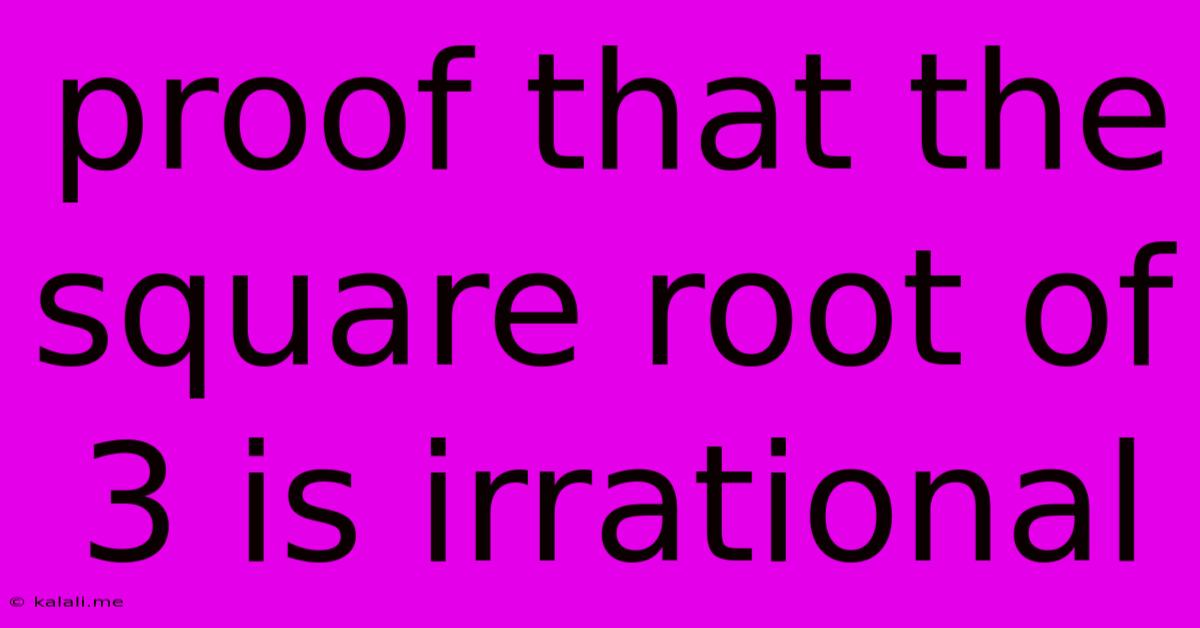Proof That The Square Root Of 3 Is Irrational
Kalali
May 25, 2025 · 3 min read

Table of Contents
Proof That the Square Root of 3 is Irrational
Meta Description: Learn how to prove the square root of 3 is irrational using a classic proof by contradiction. This article explores the fundamental concepts of number theory and provides a clear, step-by-step demonstration. Understand the difference between rational and irrational numbers and master this important mathematical concept.
The question of whether the square root of 3 is rational or irrational is a fundamental problem in number theory. Many students encounter this during their mathematical education, and understanding the proof solidifies their grasp of core mathematical concepts like rational numbers, irrational numbers, and proof by contradiction. This article will provide a clear and concise proof that √3 is indeed irrational.
Understanding Rational and Irrational Numbers
Before diving into the proof, let's define our terms. A rational number can be expressed as a fraction p/q, where p and q are integers, and q is not zero. Examples include 1/2, 3/4, and even integers like 4 (which can be written as 4/1). An irrational number, on the other hand, cannot be expressed as such a fraction. Famous examples include π (pi) and e (Euler's number).
Proof by Contradiction: The Core Method
We'll use a method called proof by contradiction. This involves assuming the opposite of what we want to prove and then showing that this assumption leads to a logical contradiction. If the assumption leads to a contradiction, it must be false, thus proving the original statement true.
The Proof: √3 is Irrational
-
Assumption: Let's assume, for the sake of contradiction, that √3 is rational. This means we can express it as a fraction p/q, where p and q are integers, q ≠ 0, and the fraction is in its simplest form (meaning p and q share no common factors other than 1).
-
Squaring Both Sides: If √3 = p/q, then squaring both sides gives us 3 = p²/q².
-
Rearranging the Equation: We can rearrange this equation to 3q² = p². This equation tells us that p² is a multiple of 3.
-
Deduction about p: If p² is a multiple of 3, then p itself must also be a multiple of 3. This is because the prime factorization of p² will contain at least two factors of 3 (since 3 is a prime number). Therefore, we can write p = 3k, where k is another integer.
-
Substitution and Simplification: Substituting p = 3k into the equation 3q² = p², we get 3q² = (3k)² = 9k².
-
Further Simplification: Dividing both sides by 3, we get q² = 3k². This shows that q² is also a multiple of 3.
-
Deduction about q: By the same logic as step 4, if q² is a multiple of 3, then q must also be a multiple of 3.
-
The Contradiction: We've now shown that both p and q are multiples of 3. This contradicts our initial assumption that the fraction p/q is in its simplest form (they share no common factors). We've reached a logical contradiction.
-
Conclusion: Since our initial assumption (that √3 is rational) leads to a contradiction, the assumption must be false. Therefore, the square root of 3 is irrational.
This proof demonstrates the power of proof by contradiction and highlights the fundamental differences between rational and irrational numbers. Understanding this proof provides a solid foundation for further explorations in number theory and abstract algebra.
Latest Posts
Latest Posts
-
Ubuntu Unzip It Ssh And To A Custom Output Name
May 25, 2025
-
Should Add Blockers Be Calling Port 443
May 25, 2025
-
Fluid Dynamics Some Of Moments Equal
May 25, 2025
-
Three Phase 3 Phase Drum Switch Wiring Diagram
May 25, 2025
-
He Who Saves A Jewish Life World
May 25, 2025
Related Post
Thank you for visiting our website which covers about Proof That The Square Root Of 3 Is Irrational . We hope the information provided has been useful to you. Feel free to contact us if you have any questions or need further assistance. See you next time and don't miss to bookmark.